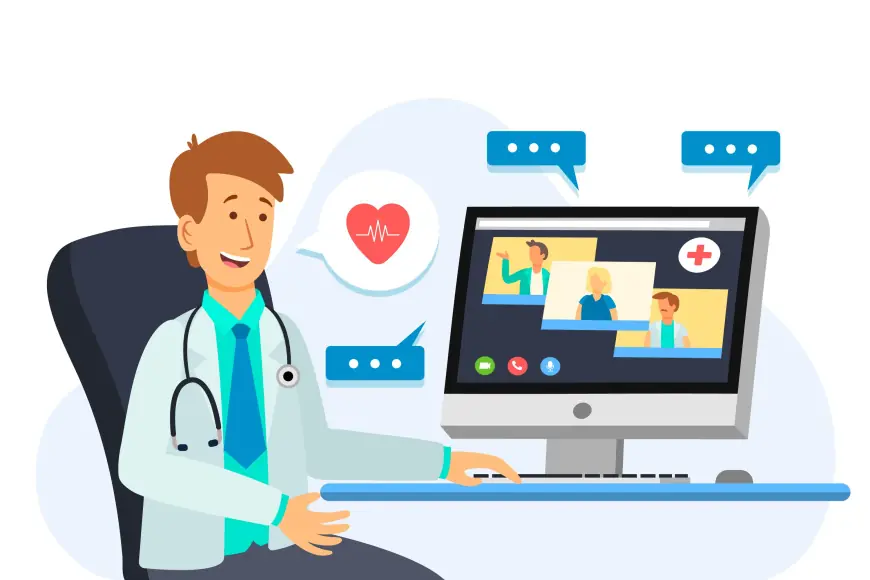How Virtual Medical Assistants Help Doctors Focus More on Patient Care
In today’s fast-paced healthcare environment, doctors often find themselves overwhelmed with paperwork, phone calls, and administrative tasks. These non-clinical responsibilities can take valuable time away from what truly matters—caring for patients.

In today’s fast-paced healthcare environment, doctors often find themselves overwhelmed with paperwork, phone calls, and administrative tasks. These non-clinical responsibilities can take valuable time away from what truly matters—caring for patients. That’s where a virtual medical assistant comes in. These trained professionals work remotely to handle routine tasks, allowing doctors to concentrate more on diagnoses, treatments, and meaningful patient interactions.
Reducing Administrative Burden on Doctors
Virtual medical assistants can take over scheduling, data entry, and handling emails.
This frees doctors from time-consuming admin work that distracts from clinical duties.
Streamlining Appointment Scheduling
Managing calendars is tiring and error-prone without support.
Virtual medical assistants handle bookings, reschedules, and reminders efficiently and accurately.
Improving Patient Communication
Patients often call with questions or need follow-up details.
Virtual assistants can answer routine queries and forward urgent concerns to the doctor quickly.
Helping with EHR Management
Doctors spend hours updating electronic health records (EHRs) each day.
Virtual medical assistants can update charts, enter notes, and retrieve information as needed.
Supporting Insurance and Billing Tasks
Billing errors can delay payment and create frustration for both patients and providers.
Virtual medical assistants help verify insurance, process claims, and reduce payment delays.
Boosting Clinic Workflow
A smoother office workflow benefits the whole healthcare team.
With assistants handling the background tasks, clinics run more smoothly and efficiently.
Allowing More Face Time with Patients
The less time doctors spend looking at screens, the more they can spend looking at patients.
Virtual support helps reduce interruptions so that doctors can give patients their full attention.
Managing Follow-Up and Referrals
Virtual assistants help schedule follow-up appointments and send referral letters.
This ensures patients continue their care without unnecessary delays or confusion.
Enhancing Patient Satisfaction
Patients appreciate when their concerns are heard and addressed quickly.
Virtual assistants can respond to messages, update records, and keep patients informed.
Supporting Doctors After Hours
Doctors often have to manage after-hours calls and reports.
Virtual assistants can handle non-urgent messages and summarize reports, reducing stress.
Helping Clinics Stay Organized
With clear digital systems and updated records, clinics stay on top of everything.
Virtual medical assistants maintain accurate logs, appointment data, and patient files.
Reducing Stress and Burnout in Doctors
Too many tasks can lead to stress and exhaustion.
Virtual support relieves pressure so doctors feel more focused and balanced.
Saving Time on Routine Tasks
Repetitive duties like checking voicemails and sending reminders waste valuable time.
Virtual assistants take care of these routine tasks so doctors can use their time wisely.
Increasing Focus During Consultations
Distractions during patient consultations reduce care quality.
When assistants handle calls and background work, doctors can give patients undivided attention.
Keeping Track of Medical Supplies
Running out of supplies during patient care can be disruptive.
Virtual assistants can track inventory, place orders, and ensure everything is stocked.
Handling Incoming Messages
Doctors receive tons of emails and messages daily.
A virtual assistant for medical practice can triage these communications and highlight the urgent ones.
Assisting in Medical Transcription
Doctors can record notes verbally and let the assistant transcribe them later.
This improves record accuracy and saves valuable consultation time.
Supporting Better Time Management
Doctors who feel more organized can plan better and stress less.
Virtual assistants help structure the day, reduce last-minute chaos, and boost productivity.
Helping with Prescription Refills
Patients often need refills for long-term medications.
Virtual assistants verify the requests and process them with the doctor’s approval.
Ensuring Timely Test Result Updates
Getting test results to patients quickly improves trust and care.
Virtual assistants follow up on lab results and inform patients promptly.
Increasing Patient Trust in the Clinic
When things run smoothly, patients feel they’re in good hands.
With virtual support keeping operations efficient, trust and loyalty grow naturally.
Supporting Multi-Location Clinics
Doctors managing several clinics need help staying on top of each one.
Virtual assistants help coordinate operations across different sites without missing a beat.
Offering Custom Support Based on Doctor’s Needs
Some doctors need more help with billing, others with scheduling.
Virtual assistants can be trained to meet the specific needs of each medical practice.
Backing Up During Staff Shortages
When in-office staff is sick or on leave, things can get chaotic.
Virtual assistants offer reliable backup and ensure no task goes unfinished.
Encouraging a Better Work-Life Balance
Doctors need rest, too, to provide the best care.
With virtual help, they can take breaks and focus on their personal lives without guilt.
Improving Overall Clinic Reputation
A well-run clinic builds a solid reputation in the community.
Virtual assistants help create a patient-friendly and professional image.
Final Thoughts
When doctors spend less time on paperwork and more time with patients, everyone wins. From smoother clinic operations to better patient experiences, virtual medical assistants are transforming healthcare support. Their work behind the scenes helps doctors focus on healing—and that’s what healthcare is all about.
What's Your Reaction?
 Like
0
Like
0
 Dislike
0
Dislike
0
 Love
0
Love
0
 Funny
0
Funny
0
 Angry
0
Angry
0
 Sad
0
Sad
0
 Wow
0
Wow
0


















































